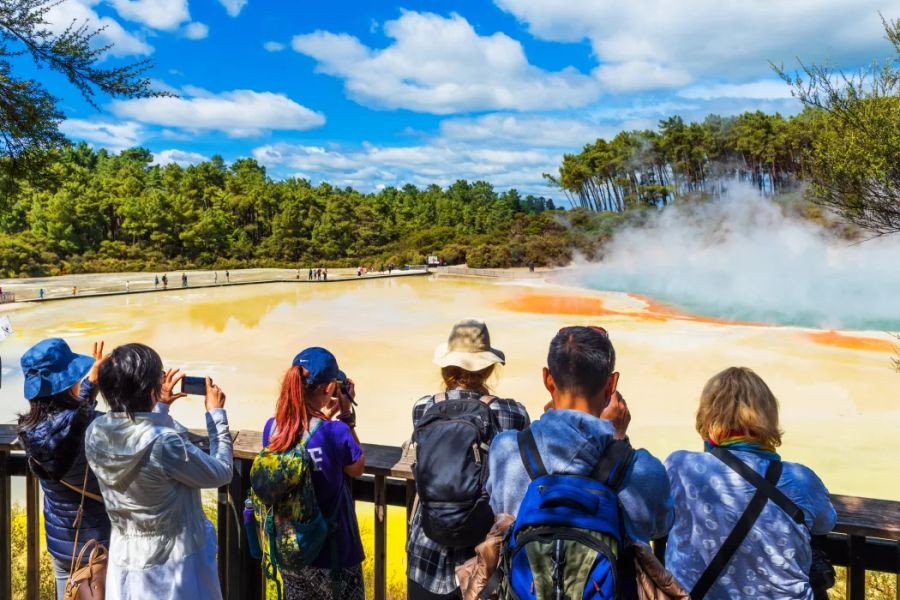Tourism in New Zealand is not just a thriving industry—it's a powerhouse for the national economy. In the last year alone, tourism contributed over NZD 17 billion, showcasing the sector's robust impact. But what's driving this impressive growth, and how can New Zealand's technology strategists leverage these insights for future advancements? This article delves into the intricate workings of the tourism industry, its economic implications, and the strategic opportunities it presents for tech innovators in New Zealand.
The Economic Backbone of New Zealand: Understanding the NZD 17 Billion Impact
Tourism's contribution to New Zealand's economy is a testament to the country's appeal as a global destination. According to Stats NZ, the tourism sector accounted for 5.8% of New Zealand's GDP in the last year, providing approximately 229,000 jobs. This significant contribution underscores the sector's role as a key economic driver.
The money generated from tourism supports various facets of the economy, from hospitality and retail to transport and infrastructure. The ripple effect of tourism spending extends beyond immediate economic gains, playing a crucial role in sustaining local communities and businesses.
Case Study: Queenstown's Tourism Boom
Queenstown, often dubbed the "Adventure Capital of the World," offers a compelling case study of tourism's economic impact. The town has seen a remarkable influx of visitors, boosting local businesses and creating job opportunities. According to a report by Tourism New Zealand, Queenstown's tourism revenue increased by 12% last year, contributing significantly to the regional economy.
Action taken by local businesses to capitalize on this growth included investing in digital marketing strategies and adopting new technologies to enhance visitor experiences. As a result, Queenstown not only attracted more tourists but also increased their length of stay and expenditure.
Technology's Role in Shaping New Zealand's Tourism Industry
Technology is rapidly transforming the tourism landscape in New Zealand. From AI-driven travel personalization to virtual reality experiences, tech advancements are enhancing how tourists experience the country. According to a 2023 report by NZTech, 60% of tourism businesses have integrated some form of digital technology into their operations.
Among the technological innovations, AI-powered chatbots are becoming a staple in customer service, offering immediate assistance and personalized travel recommendations. Additionally, virtual reality is being used to provide immersive pre-travel experiences, allowing potential visitors to explore destinations before booking.
Case Study: Rotorua's Digital Transformation
Rotorua, renowned for its geothermal wonders and Maori culture, has embraced digital transformation to boost tourism. By implementing a smart tourism framework, Rotorua has integrated IoT devices to monitor visitor flow and optimize resource allocation. This data-driven approach has led to a 15% increase in visitor satisfaction, as reported by the Rotorua Lakes Council.
Moreover, the use of augmented reality (AR) apps to enrich cultural tours has significantly enhanced the visitor experience, providing interactive storytelling elements that deepen engagement and understanding.
Challenges and Opportunities: Balancing Growth with Sustainability
While tourism brings economic benefits, it also poses challenges, particularly in terms of sustainability. The influx of visitors can strain infrastructure and natural resources, raising concerns about environmental impact. According to the Ministry of Business, Innovation, and Employment (MBIE), sustainable tourism practices are essential to ensure long-term viability.
Technology can play a pivotal role in addressing these challenges. For instance, using big data analytics, tourism operators can optimize visitor management, reducing overcrowding and minimizing environmental impact. Additionally, promoting eco-friendly travel options and sustainable accommodations can help balance growth with ecological preservation.
Pros and Cons of Tourism Growth
Pros:
- Economic Boost: Generates significant revenue and job opportunities.
- Cultural Exchange: Promotes global understanding and cultural diversity.
- Infrastructure Development: Encourages improvements in transport and public facilities.
Cons:
- Environmental Impact: Strains natural resources and ecosystems.
- Overcrowding: Can lead to congestion and diminished visitor experiences.
- Seasonal Dependency: Economic fluctuations tied to tourist seasons.
Future Trends: Navigating the Next Wave of Tourism Innovation
The future of tourism in New Zealand is poised for exciting developments, driven by technological advancements. By 2030, it's predicted that 70% of all travel bookings will be made digitally, with AI playing a central role in personalizing travel experiences. Furthermore, the rise of sustainable travel is expected to shape industry practices, with more eco-conscious travelers seeking environmentally friendly options.
As New Zealand continues to innovate, the integration of smart technologies and sustainable practices will be crucial in maintaining the country's status as a premier tourist destination. For technology strategists, this presents an opportunity to lead the charge in developing solutions that enhance both the economic and environmental aspects of tourism.
Conclusion: Harnessing Technology for a Sustainable Tourism Future
New Zealand's tourism industry is a vital component of the national economy, and its continued growth offers significant opportunities for technological innovation. By leveraging advanced technologies and prioritizing sustainable practices, New Zealand can ensure that tourism remains a thriving sector that benefits both the economy and the environment.
As a technology strategist, consider how you can contribute to this dynamic industry. Whether through developing cutting-edge travel apps, enhancing data-driven visitor management systems, or promoting sustainable travel solutions, your expertise can help shape the future of tourism in New Zealand. Share your thoughts and join the conversation on how technology can drive sustainable growth in the tourism sector!
People Also Ask
- How does tourism impact New Zealand's economy? Tourism contributes significantly to New Zealand's GDP, supporting jobs and driving infrastructure development.
- What are the biggest misconceptions about tourism in New Zealand? A common myth is that tourism only benefits large cities; however, regional areas like Queenstown and Rotorua also see substantial gains.
- What are the best strategies for enhancing tourism in New Zealand? Adopting digital technologies and promoting sustainable practices are key strategies for boosting tourism.
Related Search Queries
- New Zealand tourism statistics 2023
- Impact of tourism on New Zealand economy
- Technological advancements in tourism
- Sustainable tourism practices in New Zealand
- Future trends in New Zealand tourism
































EHPAD INVEST
8 months ago